Peanuts are known for their health benefits, but do they contain a lot of calories, and are they fattening? Let’s explore this topic further.
1 How Many Calories Are in 100g of Peanuts?
Peanuts, also known as groundnuts, are a popular legume in Vietnam. According to nutrition experts, 100g of peanut kernels contain approximately 567 calories. This calorie count can vary depending on the method of preparation.
For boiled peanuts, the calorie count is around 500-550 per 100g, while roasted peanuts contain about 650-700 calories per 100g.
 Calorie content in 100g of peanuts
Calorie content in 100g of peanuts
2 Nutritional Composition of Peanuts
The nutritional content of 100g of peanut kernels is as follows:
-
Calories: 567
-
Water: 7%
-
Protein: 25.8g
-
Carbohydrates: 16.1g
-
Sugar: 4.7g
-
Fiber: 8.5g
-
Fat: 49.2g
-
Saturated: 6.28g
-
Monounsaturated: 24.43g
-
Polyunsaturated: 15.56g
-
Trans: 0g
Peanuts contain a significant amount of fat, ranging from 44-56%, mostly in the form of monounsaturated fats, composed of oleic and linoleic acids.
They are also a good source of protein, providing about 22-30%, which is beneficial for the body. In contrast, carbohydrates make up only 13-16%, so they do not cause a spike in blood sugar levels after consumption.
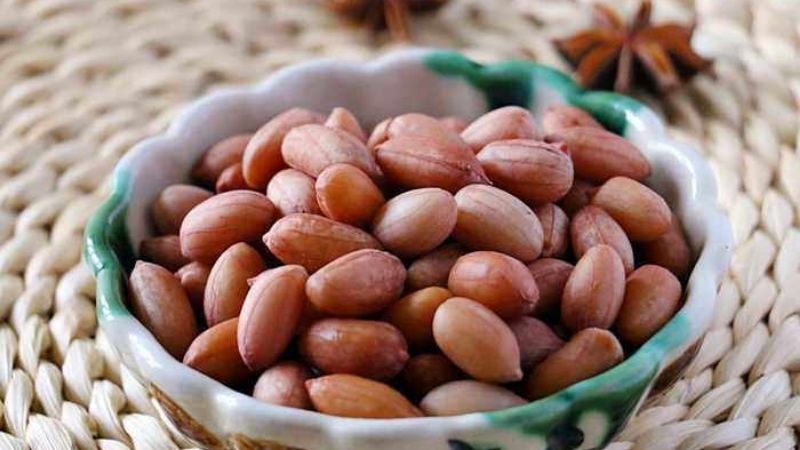 Nutritional composition of peanuts
Nutritional composition of peanuts
3 What Are the Benefits of Eating Peanuts?
Weight Loss Support
Despite their high-fat and calorie content, peanuts do not contribute to weight gain due to their low carbohydrate content. In fact, they help maintain weight and reduce the risk of obesity.
Nutrition experts attribute this effect to the presence of folic acid and monounsaturated fatty acids in peanuts, which help lower high blood cholesterol levels. Additionally, the cellulose in peanuts plays a crucial role in the intestines and does not cause obesity.
Improved Cardiovascular Health
Peanuts, along with other legumes, are highly beneficial for cardiovascular health. This is because they contain beneficial minerals such as magnesium, omega-3, and oleic acid, which promote heart health.
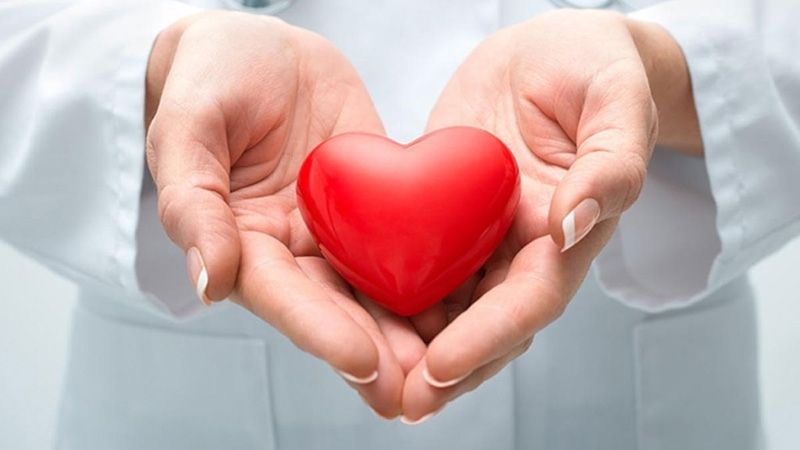 Peanuts are good for the heart
Peanuts are good for the heart
Gallstone Prevention
Gallstones are often associated with high cholesterol levels, and peanuts have the ability to lower cholesterol in the body. Therefore, regular consumption of peanuts can reduce the risk of gallstones in both men and women.
4 Do Peanuts Make You Fat?

Despite their high-calorie content, peanuts consumed in moderation can aid in weight loss. Research has shown that individuals who regularly include nuts in their diet tend to have lower IBM (Body Impedance Measurement) scores.
Peanuts are an ideal snack for dieters as they provide a sense of fullness, curbing appetite and overeating during main meals. However, it is recommended to limit intake to 30 grams (approximately 53 nuts) per day, totaling 160 calories, to maintain a healthy weight.
Additionally, peanuts are nutrient-dense, promoting enhanced metabolism and the utilization of excess energy in the body.
5 Are Peanuts Good for You?
While peanuts offer health benefits, excessive consumption can lead to weight gain due to their high-calorie content. Therefore, whether peanuts aid in weight loss or weight gain depends on the quantity consumed daily. Moderation is key; a small amount can be beneficial, but overeating can lead to weight gain.
Nutrition experts recommend a maximum daily intake of 30 grams of peanuts (about 53 nuts), which equates to approximately 160 calories and does not contribute to weight gain.
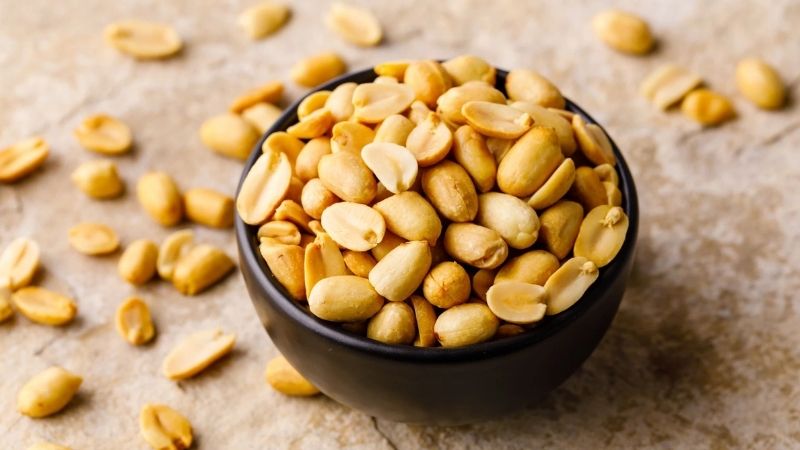 Limit peanut consumption to 30 grams per day
Limit peanut consumption to 30 grams per day
Certain individuals should refrain from excessive peanut consumption, including:
-
People with gout: Gout patients who consume large amounts of peanuts may experience reduced uric acid excretion, worsening their condition. Additionally, weight gain associated with overeating can indirectly contribute to gout.
-
Individuals who have undergone cholecystectomy: The gallbladder aids in fat digestion, so its absence can lead to fat accumulation in the body, increasing the risk of various health issues.
-
Hypertensive individuals: The high-fat content of peanuts can elevate blood fat levels, posing a risk to those with high blood pressure.
-
Those aiming to lose weight: While a moderate amount of peanuts can support weight loss, overeating can result in excess calorie intake and subsequent weight gain.
-
Individuals with digestive issues: The high protein and fat content in peanuts can strain the digestive system.
-
People prone to overheating: Excessive peanut consumption may cause fatigue, shortness of breath, and increased body temperature.
6 How to Eat Peanuts for Effective Weight Loss
To incorporate peanuts into your diet while losing weight, opt for boiled or roasted peanuts instead of fried or processed varieties. Include them in salads to further reduce calorie intake.
Adhere to a maximum daily intake of 30 grams to maintain a healthy weight and avoid weight gain.
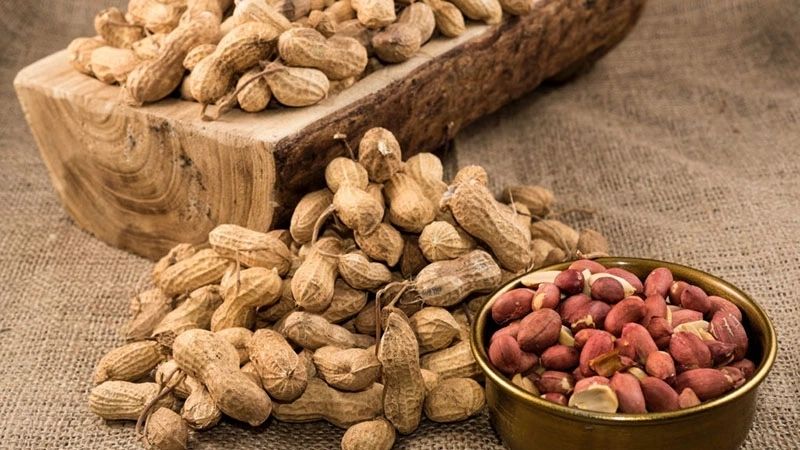 Effective weight loss with peanuts
Effective weight loss with peanuts
7 When Is the Best Time to Eat Peanuts?
Peanuts promote a sense of fullness and curb appetite, making them ideal for consumption during breakfast or before breakfast if you’re trying to lose weight.
However, avoid eating peanuts late at night as the high-fat content may cause digestive issues.
 Eat peanuts during breakfast
Eat peanuts during breakfast
8 Delicious Peanut-Based Dishes
Peanut Brittle
This sweet and savory treat is a nostalgic favorite for many. The combination of sugary brittle and roasted peanuts creates an irresistible snack. You can easily make this at home and store it in small packets for later enjoyment.
Reference:
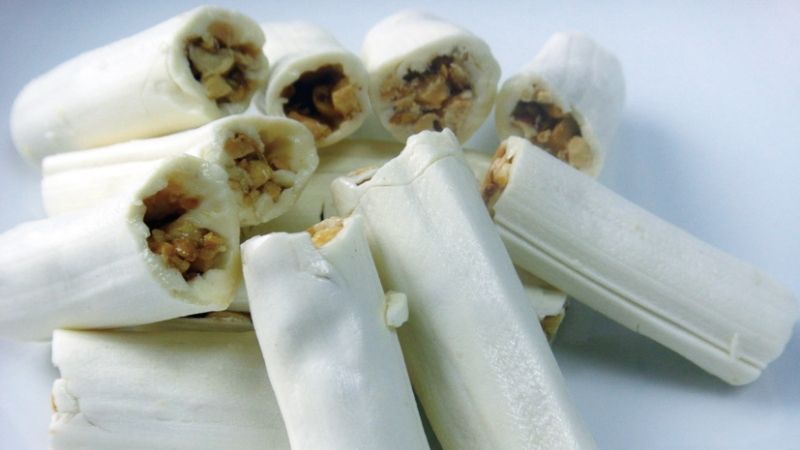 Peanut Brittle
Peanut Brittle
Peanut Milk
Peanut milk is a nutritious and easy-to-make beverage for the whole family. It has a distinctive peanut aroma, a creamy texture, and a non-greasy taste.
Reference:
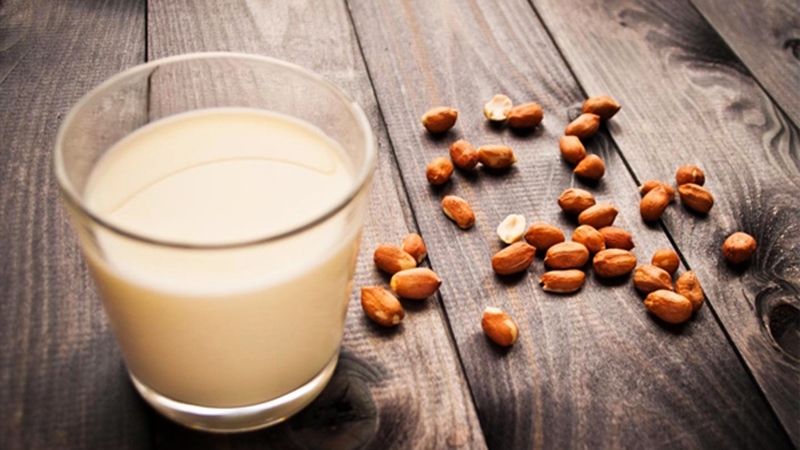 Peanut Milk
Peanut Milk
Garlic-Coated Peanuts
This mouthwatering snack is perfect for both casual and festive occasions. The peanuts are roasted to a crisp, then coated in a savory blend of spices and fried garlic. It’s a must-have during rainy days.
Reference:
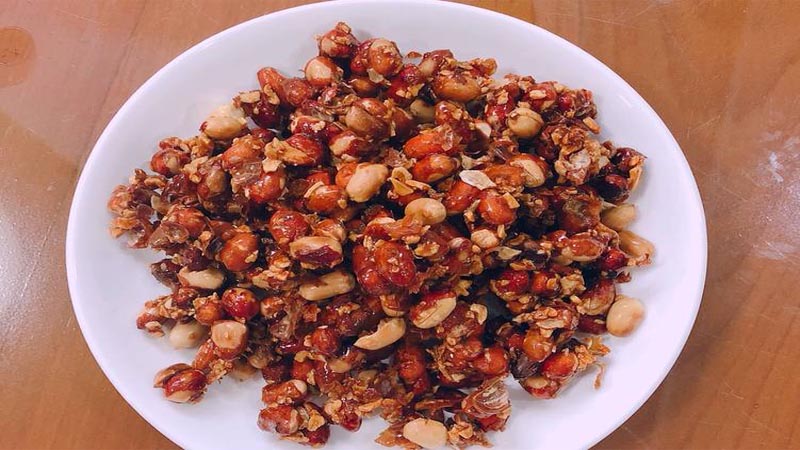 Garlic-Coated Peanuts
Garlic-Coated Peanuts
9 Precautions When Eating Peanuts
While peanuts offer numerous benefits, keep the following precautions in mind:
-
Avoid peanuts if you have an allergy.
-
Individuals with stomach or digestive issues should exercise caution as peanuts may hinder digestion.
-
Do not consume moldy peanuts as they may contain carcinogens or cause food poisoning.
-
Consume no more than 30 grams of peanuts per day.
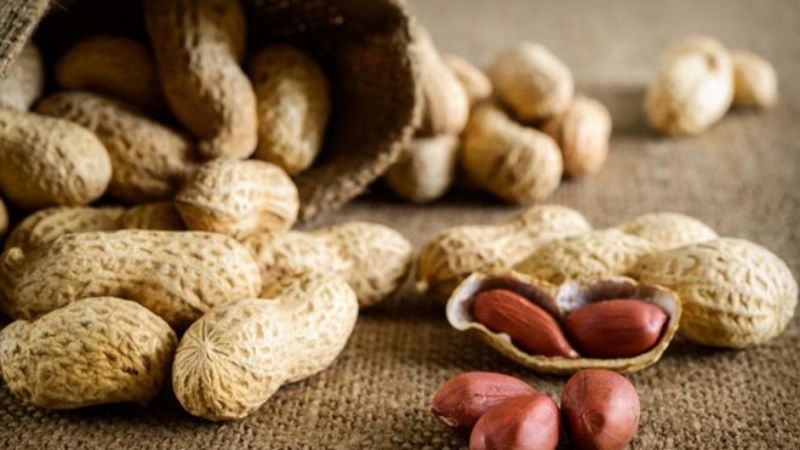 Precautions when eating peanuts
Precautions when eating peanuts
10 Frequently Asked Questions About Peanuts
Does Peanut Butter Make You Fat?
With approximately 588 calories per 100 grams, peanut butter does not cause weight gain and is often included in weight-loss diets. However, excessive consumption can lead to weight gain. As with peanuts, the effect on weight depends on the quantity consumed.
Do Roasted and Salted Peanuts Cause Weight Gain?
Roasted and salted peanuts, often seasoned with sugar and other spices, can be detrimental to health and contribute to weight gain if consumed in excess. Therefore, moderation is key.
Does Coconut Peanut Candy Cause Weight Gain?
Coconut milk has a high-calorie content, and even though the combination with peanuts may reduce the overall calorie count, it is best avoided during weight loss endeavors.
 Avoid coconut peanut candy during weight loss
Avoid coconut peanut candy during weight loss
In reality, whether peanuts lead to weight gain depends on how and when they are consumed, as well as individual dietary habits. While they offer health benefits, improper consumption can have adverse effects. Incorporating physical exercise can aid in the efficient utilization of energy.
References: USDA, Vinmec

































